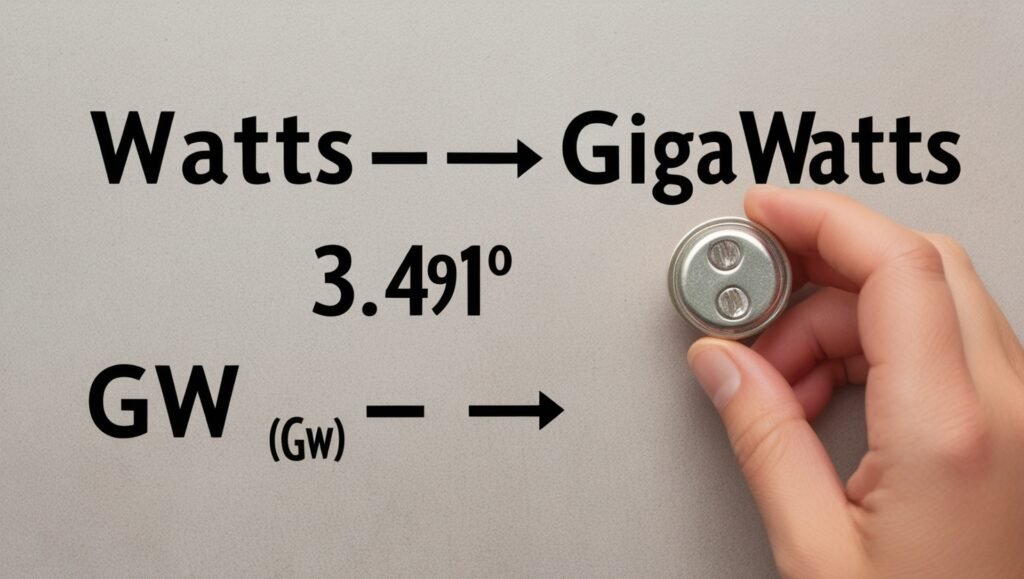Watts, gigawatts—these are terms we often come across, especially when discussing electricity usage or power generation. But what do they really mean, and how do you convert between them? Today, we’re diving into a practical example: converting 3.49e10 watts to GW.
Understanding the Basics: Watts and Gigawatts
Before we jump into the conversion, it’s important to get a clear idea of what watts and gigawatts represent.
- Watts (W): A watt is a basic unit of power in the International System of Units (SI). It measures how much energy is being used or produced.
- 1 watt = 1 joule per second
- It’s often used in everyday devices like light bulbs or appliances.
- Gigawatts (GW): A gigawatt is a much larger unit of power, often used to measure electricity generation or large power plants.
- 1 gigawatt = 1 billion watts (1 GW = 1,000,000,000 W)
Converting Watts to Gigawatts: The Simple Formula
To convert watts to gigawatts, we need to divide the number of watts by 1 billion (1,000,000,000). This is because there are a billion watts in one gigawatt.
Here’s the formula:
Gigawatts (GW)=Watts (W)1,000,000,000\text{Gigawatts (GW)} = \frac{\text{Watts (W)}}{1,000,000,000}Gigawatts (GW)=1,000,000,000Watts (W)
In our case, we want to convert 3.49e10 watts into gigawatts.
Step-by-Step Conversion of 3.49e10 Watts to GW
Let’s break down the conversion step by step:
- Start with the given value: 3.49e10 Watts to GW.
- What does 3.49e10 mean?
- 3.49e10 is scientific notation for 34,900,000,000 watts, or 34.9 billion watts.
- What does 3.49e10 mean?
- Apply the conversion formula:
Gigawatts (GW)=34,900,000,0001,000,000,000=34.9 GW\text{Gigawatts (GW)} = \frac{34,900,000,000}{1,000,000,000} = 34.9 \text{ GW}Gigawatts (GW)=1,000,000,00034,900,000,000=34.9 GW
So, 3.49e10 watts is equal to 34.9 gigawatts.
A Real-World Example of 34.9 Gigawatts
To make this more tangible, let’s put 34.9 gigawatts into perspective. For context, the total power output of large power stations is measured in gigawatts. For example, some nuclear power plants generate between 1-3 gigawatts.
So, a power output of 34.9 GW is like combining the energy production of several large power plants.
User Experience: A Journey to Understanding Power Units
I remember a time when I was trying to understand how much power a new factory’s machinery would require. I had a basic understanding of watts, but when I received an estimate from the engineers, they were throwing around terms like megawatts and gigawatts. It felt overwhelming.
One day, I was looking at a generator’s output capacity, which was measured in watts, but I needed to compare it with the factory’s requirements in gigawatts. That’s when I learned to convert between these units.
It turns out, once you grasp that one gigawatt is just one billion watts, it all becomes much simpler. I used the same method described above to figure out how much power was needed. Knowing that 3.49e10 Watts to GW equals 34.9 gigawatts, I could now confidently work with different scales of power and make informed decisions about energy requirements.
Why Is This Conversion Important?
You might wonder why converting watts to gigawatts (or vice versa) is important. Here are some reasons:
- Understanding Power Generation: Large-scale power plants, like those using nuclear, coal, or renewable energy sources, produce power in the range of gigawatts. Understanding these units helps when comparing how much power different plants generate.
- Energy Consumption: On a smaller scale, appliances in homes use watts, but as you scale up to entire buildings, factories, or cities, power needs are measured in megawatts or gigawatts. Knowing the conversions helps bridge the gap between smaller devices and large-scale infrastructure.
- Scientific Communication: For scientists, engineers, and energy analysts, converting between these units ensures that everyone speaks the same language when discussing power and energy, especially when presenting data or reports.

Converting Other Power Units
If you find yourself working with different power units, the process of conversion is the same:
- From Watts to Kilowatts:
Kilowatts (kW)=Watts (W)1,000\text{Kilowatts (kW)} = \frac{\text{Watts (W)}}{1,000}Kilowatts (kW)=1,000Watts (W) - From Watts to Megawatts:
Megawatts (MW)=Watts (W)1,000,000\text{Megawatts (MW)} = \frac{\text{Watts (W)}}{1,000,000}Megawatts (MW)=1,000,000Watts (W) - From Watts to Gigawatts:
Gigawatts (GW)=Watts (W)1,000,000,000\text{Gigawatts (GW)} = \frac{\text{Watts (W)}}{1,000,000,000}Gigawatts (GW)=1,000,000,000Watts (W)
For those working in industries like energy production, electrical engineering, or even in academic research, these conversions are critical to understanding the scale of energy being produced or consumed.
Common Power Unit Conversions Table
| Power Unit | Equivalent in Watts | Notes |
| 1 watt (W) | 1 W | Basic unit of power |
| 1 kilowatt (kW) | 1,000 W | Commonly used in households |
| 1 megawatt (MW) | 1,000,000 W | Used for larger energy systems |
| 1 gigawatt (GW) | 1,000,000,000 W | Used for large power plants |
Applications of Gigawatts in Energy Production
Gigawatts are most commonly used when discussing large energy production projects, such as:
- Renewable Energy Plants: Solar farms, wind farms, and hydroelectric dams produce energy in gigawatts. For example, large-scale solar farms can produce over 1 GW of power.
- Nuclear Power Plants: A typical nuclear power plant can produce around 1–3 gigawatts of power. Multiple nuclear plants combined often contribute significant energy to national grids.
- National Grid Usage: Countries often use gigawatts as a standard when reporting their total energy consumption or generation. For instance, the total power capacity of the United States electrical grid is often measured in gigawatts.
Conclusion
Converting 3.49e10 Watts to GW results in 34.9 gigawatts, a substantial amount of power when compared to real-world energy production systems like power plants or national energy grids.
Understanding these conversions is essential whether you’re an engineer working on energy systems, a student studying physics, or someone interested in how electricity is generated and used. Hopefully, this guide has made the process of converting watts to gigawatts a little clearer and more accessible.
By simplifying the maths and providing practical examples, you can now confidently talk about and work with these units. Whether it’s a personal experience of figuring out how much power your machinery uses or you’re involved in large-scale energy discussions, these conversions will come in handy 3.49e10 Watts to GW.
FAQs
1. What is the difference between watts, kilowatts, and gigawatts?
- Watts (W): The basic unit of power.
- Kilowatts (kW): 1 kilowatt = 1,000 watts.
- Gigawatts (GW): 1 gigawatt = 1,000,000,000 watts (or 1 billion watts).
2. How do I convert watts to kilowatts or megawatts?
- To convert watts to kilowatts: Divide the number of watts by 1,000.
- To convert watts to megawatts: Divide the number of watts by 1,000,000.
3. How many gigawatts are needed to power a city?
- The amount of gigawatts needed to power a city depends on the size and energy consumption of the city. For example, a large city like New York may require 12–15 gigawatts during peak hours.
4. What appliances use the most power in watts?
- Household appliances like air conditioners, refrigerators, and electric water heaters use the most power. These are measured in watts, but when you add up the power used by all devices in a building or community, you get into kilowatt or even megawatt ranges.







